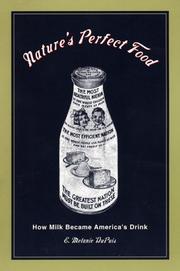| Listing 1 - 10 of 11 | << page >> |
Sort by
|
Book
ISBN: 0520962133 9780520962132 9780520275478 9780520287488 0520275470 0520287487 Year: 2015 Publisher: Oakland, California
Abstract | Keywords | Export | Availability | Bookmark
 Loading...
Loading...Choose an application
- Reference Manager
- EndNote
- RefWorks (Direct export to RefWorks)
Throughout American history, ingestion (eating) has functioned as a metaphor for interpreting and imagining this society and its political systems. Discussions of American freedom itself are pervaded with ingestive metaphors of choice (what to put in) and control (what to keep out). From the country's founders to the abolitionists to the social activists of today, those seeking to form and reform American society have cast their social-change goals in ingestive terms of choice and control. But they have realized their metaphors in concrete terms as well, purveying specific advice to the public about what to eat or not. These conversations about "social change as eating" reflect American ideals of freedom, purity, and virtue. Drawing on social and political history as well as the history of science and popular culture, Dangerous Digestion examines how American ideas about dietary reform mirror broader thinking about social reform. Inspired by new scientific studies of the human body as a metabiome-a collaboration of species rather than an isolated, intact, protected, and bounded individual-E. Melanie DuPuis invokes a new metaphor-digestion-to reimagine the American body politic, opening social transformations to ideas of mixing, fermentation, and collaboration. In doing so, the author explores how social activists can rethink politics as inclusive processes that involve the inherently risky mixing of cultures, standpoints, and ideas.
Diet --- Food habits --- Health --- Food --- Nutrition --- Social aspects --- Political aspects --- History. --- Diet - Social aspects - United States. --- american body politic. --- american dietary guidelines. --- american eating. --- dangerous diets. --- dietary control in america. --- dietary reform. --- digestion. --- food and nutrition. --- food control. --- food habits in the us. --- food obsession. --- food science. --- gut health. --- history of food. --- history of nutrition. --- ideal diet for humans. --- ingestion. --- marketing nutrition. --- popular diets. --- social activism in america. --- social aspects of food. --- what should i eat. --- white middle class diets.

ISBN: 0814719600 0814719619 9780814719619 0814785433 Year: 2004 Publisher: New York New York university press
Abstract | Keywords | Export | Availability | Bookmark
 Loading...
Loading...Choose an application
- Reference Manager
- EndNote
- RefWorks (Direct export to RefWorks)
Air --- Pollution --- Political aspects --- Social aspects
Book
ISBN: 9780814785423 Year: 2002 Publisher: New York, NY
Abstract | Keywords | Export | Availability | Bookmark
 Loading...
Loading...Choose an application
- Reference Manager
- EndNote
- RefWorks (Direct export to RefWorks)
Book
ISBN: 9780814785430 Year: 2004 Publisher: New York, NY
Abstract | Keywords | Export | Availability | Bookmark
 Loading...
Loading...Choose an application
- Reference Manager
- EndNote
- RefWorks (Direct export to RefWorks)

ISBN: 9780814785423 9780814719374 Year: 2002 Publisher: New York, N.Y. New York University Press
Abstract | Keywords | Export | Availability | Bookmark
 Loading...
Loading...Choose an application
- Reference Manager
- EndNote
- RefWorks (Direct export to RefWorks)
Book
ISBN: 9780415671460 9780415747691 9780203804520 9781136641183 9781136641220 9781136641237 0415671469 0415747694 Year: 2014 Publisher: New York (N.Y.): Routledge,
Abstract | Keywords | Export | Availability | Bookmark
 Loading...
Loading...Choose an application
- Reference Manager
- EndNote
- RefWorks (Direct export to RefWorks)
"Farmers' markets, veggie boxes, local foods, organic products and Fair Trade goods - how have these once novel, "alternative" foods and the people and networks supporting them become increasingly familiar features of everyday consumption? Are the visions of "alternative worlds" built on ethics of sustainability, social justice, animal welfare and the aesthetic values of local food cultures and traditional crafts still credible now that these foods crowd supermarket shelves and other "mainstream" shopping outlets? This timely book provides a critical review of the growth of alternative food networks and their struggle to defend their ethical and aesthetic values against the standardising pressures of the corporate mainstream with its "placeless and nameless" global supply networks. It explores how these alternative movements are "making a difference" and their possible role as fears of global climate change and food insecurity intensify. It assesses the different positions around these networks from three major arenas of food activism and politics: Britain and Western Europe, the United States, and the global Fair Trade economy. This comparative perspective runs throughout the book to fully explore the progressive erosion of the interface between alternative and mainstream food provisioning. As the era of "cheap food" draws to a close, analysis of the limitations of market-based social change and the future of alternative food economies and localist food politics place this book at the cutting-edge of the field"
AA / International- internationaal --- 338.754.4 --- 338.722.8 --- 338.724 --- 338.727 --- 338.730 --- 339.325.2 --- 351.2 --- 355 --- 174 --- Levensmiddelenindustrie. --- Landbouwcrisissen. Landbouwoverschotten en -tekorten. Honger. --- Teelten. --- Veeteelt en producten van de veeteelt en van de visvangst. --- Extractieve nijverheid: algemeenheden. --- Uitgaven voor voeding. --- Openbare gezondheid. Milieubescherming. Milieuvervuiling. --- Milieu --- Verband tussen de ethiek en de economie. Ethiek en bedrijf. --- Food industry and trade. --- Food industry and trade --- Food supply --- Consumption (Economics). --- Moral and ethical aspects. --- Consumption (Economics) --- Consumer demand --- Consumer spending --- Consumerism --- Spending, Consumer --- Demand (Economic theory) --- Food control --- Produce trade --- Agriculture --- Food security --- Single cell proteins --- Food preparation industry --- Food processing industry --- Food trade --- Agricultural processing industries --- Processed foods --- Moral and ethical aspects --- Food --- Food processing --- Food technology --- Processing --- Food industry and trade - Moral and ethical aspects --- Food supply - Moral and ethical aspects --- Levensmiddelenindustrie --- Landbouwcrisissen. Landbouwoverschotten en -tekorten. Honger --- Teelten --- Veeteelt en producten van de veeteelt en van de visvangst --- Extractieve nijverheid: algemeenheden --- Uitgaven voor voeding --- Openbare gezondheid. Milieubescherming. Milieuvervuiling --- Verband tussen de ethiek en de economie. Ethiek en bedrijf
Book
ISBN: 113664122X 1283462397 9786613462398 1136641238 020380452X Year: 2012 Publisher: Abingdon, Oxon ; New York : Routledge,
Abstract | Keywords | Export | Availability | Bookmark
 Loading...
Loading...Choose an application
- Reference Manager
- EndNote
- RefWorks (Direct export to RefWorks)
"Farmers' markets, veggie boxes, local foods, organic products and Fair Trade goods - how have these once novel, "alternative" foods and the people and networks supporting them become increasingly familiar features of everyday consumption? Are the visions of "alternative worlds" built on ethics of sustainability, social justice, animal welfare and the aesthetic values of local food cultures and traditional crafts still credible now that these foods crowd supermarket shelves and other "mainstream" shopping outlets? This timely book provides a critical review of the growth of alternative food networks and their struggle to defend their ethical and aesthetic values against the standardising pressures of the corporate mainstream with its "placeless and nameless" global supply networks. It explores how these alternative movements are "making a difference" and their possible role as fears of global climate change and food insecurity intensify. It assesses the different positions around these networks from three major arenas of food activism and politics: Britain and Western Europe, the United States, and the global Fair Trade economy. This comparative perspective runs throughout the book to fully explore the progressive erosion of the interface between alternative and mainstream food provisioning. As the era of "cheap food" draws to a close, analysis of the limitations of market-based social change and the future of alternative food economies and localist food politics place this book at the cutting-edge of the field"--
Food industry and trade. --- Food industry and trade --- Food supply --- Consumption (Economics) --- Moral and ethical aspects.
Book
Year: 1993 Publisher: Washington, DC : U.S. Dept. of Agriculture, Economic Research Service, Agriculture and Rural Economy Division,
Abstract | Keywords | Export | Availability | Bookmark
 Loading...
Loading...Choose an application
- Reference Manager
- EndNote
- RefWorks (Direct export to RefWorks)
Franchises (Retail trade) --- Rural development --- Entrepreneurship --- United States.


ISBN: 9780814785430 9780814719602 Year: 2004 Publisher: New York, N.Y. New York University Press
Abstract | Keywords | Export | Availability | Bookmark
 Loading...
Loading...Choose an application
- Reference Manager
- EndNote
- RefWorks (Direct export to RefWorks)
Book

ISBN: 0813591988 0813592003 9780813592008 9780813591988 9780813591964 0813591961 9780813591971 081359197X 9780813591995 Year: 2017 Publisher: New Brunswick, NJ
Abstract | Keywords | Export | Availability | Bookmark
 Loading...
Loading...Choose an application
- Reference Manager
- EndNote
- RefWorks (Direct export to RefWorks)
The act of eating defines and redefines borders. What constitutes "American" in our cuisine has always depended on a liberal crossing of borders, from "the line in the sand" that separates Mexico and the United States, to the grassland boundary with Canada, to the imagined divide in our collective minds between "our" food and "their" food. Immigrant workers have introduced new cuisines and ways of cooking that force the nation to question the boundaries between "us" and "them." The stories told in Food Across Borders highlight the contiguity between the intimate decisions we make as individuals concerning what we eat and the social and geopolitical processes we enact to secure nourishment, territory, and belonging. Published in cooperation with the William P. Clements Center for Southwest Studies, Southern Methodist University.
Cooking, American --- Food habits --- American cooking --- Cookery, American --- Eating --- Food customs --- Foodways --- Human beings --- Habit --- Manners and customs --- Diet --- Nutrition --- Oral habits --- Social aspects. --- United States --- Emigration and immigration
| Listing 1 - 10 of 11 | << page >> |
Sort by
|

 Search
Search Feedback
Feedback About UniCat
About UniCat  Help
Help News
News